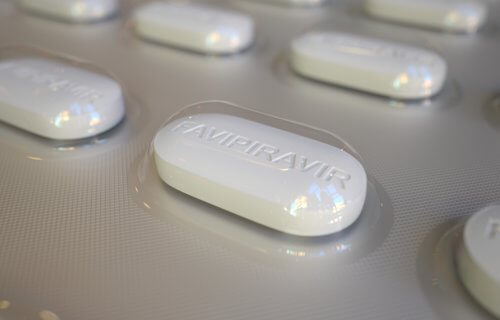LEUVEN, Belgium — When it comes to the coronavirus pandemic, studies on potential treatments can be just as controversial as the illness itself. That’s been the case with hydroxychloroquine. While some researchers are calling the drug an important resource in the fight against COVID-19, a team in Belgium is the latest to say the medication is not helpful at all. Their study isn’t all bad news however. The authors say favipiravir, another drug commonly used for the flu, can curb the spread.
Virologists at KU Leuven Rega Institute are part of the worldwide effort to find a vaccine for SARS-CoV-2, the virus causing COVID-19. They are also testing a variety of existing drugs to see if any can be repurposed for coronavirus treatment. While tests on hamsters find hydroxychloroquine has little effect, high doses of favipiravir have a significant impact on the virus.
“Despite the lack of clear evidence in animal models or clinical studies, many COVID-19 patients have already been treated with hydroxychloroquine,” explains Joana Rocha-Pereira in a university release. “Based on these results and the results of other teams, we advise against further exploring the use of hydroxychloroquine as a treatment against COVID-19.”
Finding a COVID alternative
Researchers compared hydroxychloroquine and favipiravir’s effectiveness after infecting hamsters with coronavirus in one of two ways. The animals were either given a high dose of COVID directly into their noses or put into a cage with another infected hamster.
The treatments started an hour before hamsters given COVID through the nose were infected. Hamsters in close contact with infected cage-mates started treatment the day before. Following four to five days of treatments, the subjects were examined to see how much of the virus was left in their systems.
For favipiravir, the results show there were hardly any infectious SARS-CoV-2 particles in hamsters who were infected through the nose. For the ones sharing a cage with other virus-carrying hamsters, they didn’t develop any noticeable infection.
Favipiravir is a broad-spectrum antiviral medication used in Japan. The results are especially promising because hamsters develop a similar lung pathology to humans when infected with coronavirus.
Humans will need a bigger dose
Researchers caution that lower doses of favipiravir will not get the job done. Despite this one caveat, the study is optimistic the drug could be used to treat recently exposed individuals.
“Other studies that used a lower dose had similar results,” notes Professor Leen Delang. “The high dose is what makes the difference. That’s important to know, because several clinical trials have already been set up to test favipiravir on humans.”
“If further research shows that the results are the same in humans, the drug could be used right after someone from a high-risk group has come into contact with an infected person. It may likely also be active during the early stages of the disease,” Suzanne Kaptein adds.
Is favipiravir a long-term answer to COVID?
Researchers say hamsters don’t display any side-effects however, they are not advising using this medication for long periods of time. The study adds more tests are needed to see how well patients tolerate the high doses of favipiravir.
Luckily, this wouldn’t be the first time humans were be given favipiravir in high doses. Ebola patients have been prescribed the drug in the past and seemed to have handled it well.
The study appears in Proceedings of the National Academy of Sciences.
Like studies? Follow us on Facebook!
